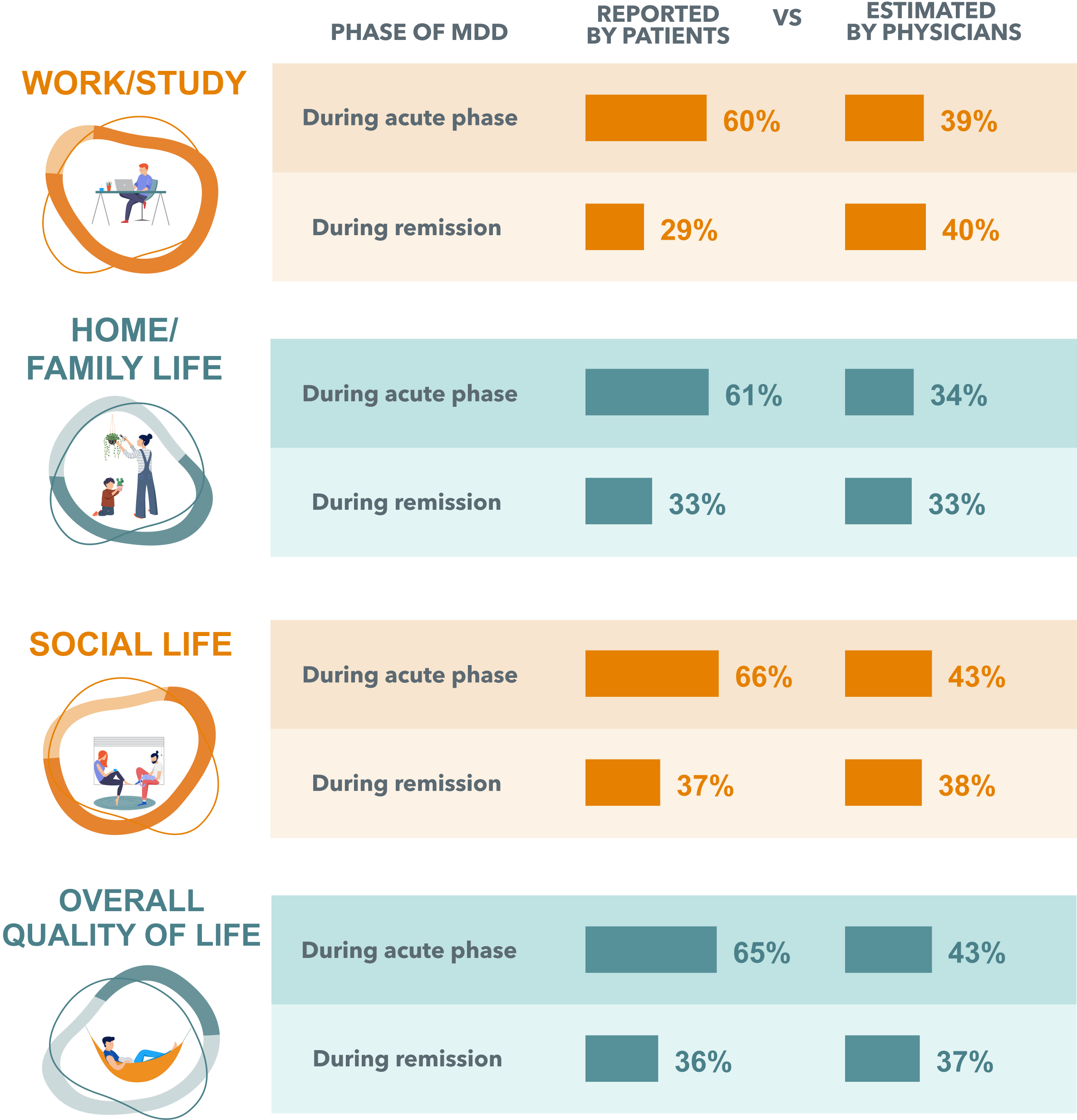Impact of emotional blunting in patients with MDD - A survey comparing the perspectives of patients and physicians
Patients with major depressive disorder (MDD) reported a substantial negative impact † of emotional blunting‡ on all aspects of daily functioning1
In a recent cross-sectional observational study, patients (n=752) and treating healthcare professionals (HCPs; n=383) were surveyed on the impact of emotional blunting ‡ on functioning in acute and remission phases ¥ of MDD from the perspective of both patients and physicians.1
During the acute phase of depression, up to two thirds of the surveyed patients report that emotional blunting has a significant impact † on various aspects of their daily functioning (work, family and social life) and overall health-related quality of life. Interestingly, one of three patients with MDD would still report significant impacts of emotional blunting during remission of depression.1
Read below data on the perspectives between patients and physicians.
Physicians may underestimate the impact† of emotional blunting on patient functioning in the acute phase.1
Perspective of patients with MDD vs physicians reporting a significant impact† of emotional blunting on various aspects of functioning and overall quality of life§ according to phase of depression.1
Proportion of patient- and physician-reported patient cases experiencing emotional blunting that significantly impacts functioning and health-related quality of life1

Adapted from Christensen MC, et al. 2022.
Data based on patient-reported cohort (acute, n=300; remission, n=452) and HCP-assessed cohort (acute, n=122; remission, n=52); p<0.01 for patient-reported vs HCP-assessed cohort in acute phase of MDD.
Adapted from Christensen MC, et al. 2022.
Data based on patient-reported cohort (acute, n=300; remission, n=452) and HCP-assessed cohort (acute, n=122; remission, n=52); p<0.01 for patient-reported vs HCP-assessed cohort in acute phase of MDD.

† Significant impact defined as a score of 6–7 on a Likert-type scale from 1 (no impact at all) to 7 (significant impact). Emotional blunting was assessed using the Oxford Depression Questionnaire (ODQ). Functional capacity in daily life activities was measured with the Functioning Assessment Short Test (FAST).
‡ Data from a cross-sectional, observational survey study with patients with MDD (patient-reported, n=752), who are using a prescribed antidepressant and who reported emotional blunting during the past 6 weeks, and HCPs (HCP-assessed, n=383) completing the survey for the last two eligible patients they had seen one in the acute phase one in the remission phase of depression.1 Emotional blunting was described as
follows: ‘Emotional effects of depression and treatment vary, but may include, for example, feeling emotionally “numbed” or “blunted” in some way; lacking positive emotions or negative emotions; feeling detached from the world around you; or “just not caring” about things that you used to care about.’
¥ Acute phase as defined as a time when symptoms are at their worst or most severe and for which antidepressant treatment is used. Remission phase as defined when patient is feeling better with significantly improved symptoms, but may still experience minor symptoms – they are still taking antidepressant medication.
§ Patient survey item: To what extent do you think your emotional blunting impacts your ability to function effectively a) at work or in studies, b) at home or in family life, c) in social life and d) overall, to what extent do you think emotional blunting impacts your overall quality of life? Reported for patients with emotional blunting: patient-reported (acute: n=300).
Abbreviations:
HCP, healthcare professional; MDD, major depressive disorder.
† Significant impact defined as a score of 6–7 on a Likert-type scale from 1 (no impact at all) to 7 (significant impact). Emotional blunting was assessed using the Oxford Depression Questionnaire (ODQ). Functional capacity in daily life activities was measured with the Functioning Assessment Short Test (FAST).
‡ Data from a cross-sectional, observational survey study with patients with MDD (patient-reported, n=752), who are using a prescribed antidepressant and who reported emotional blunting during the past 6 weeks, and HCPs (HCP-assessed, n=383) completing the survey for the last two eligible patients they had seen one in the acute phase one in the remission phase of depression.1 Emotional blunting was described as
follows: ‘Emotional effects of depression and treatment vary, but may include, for example, feeling emotionally “numbed” or “blunted” in some way; lacking positive emotions or negative emotions; feeling detached from the world around you; or “just not caring” about things that you used to care about.’
¥ Acute phase as defined as a time when symptoms are at their worst or most severe and for which antidepressant treatment is used. Remission phase as defined when patient is feeling better with significantly improved symptoms, but may still experience minor symptoms – they are still taking antidepressant medication.
§ Patient survey item: To what extent do you think your emotional blunting impacts your ability to function effectively a) at work or in studies, b) at home or in family life, c) in social life and d) overall, to what extent do you think emotional blunting impacts your overall quality of life? Reported for patients with emotional blunting: patient-reported (acute: n=300).
Abbreviations:
HCP, healthcare professional; MDD, major depressive disorder.

